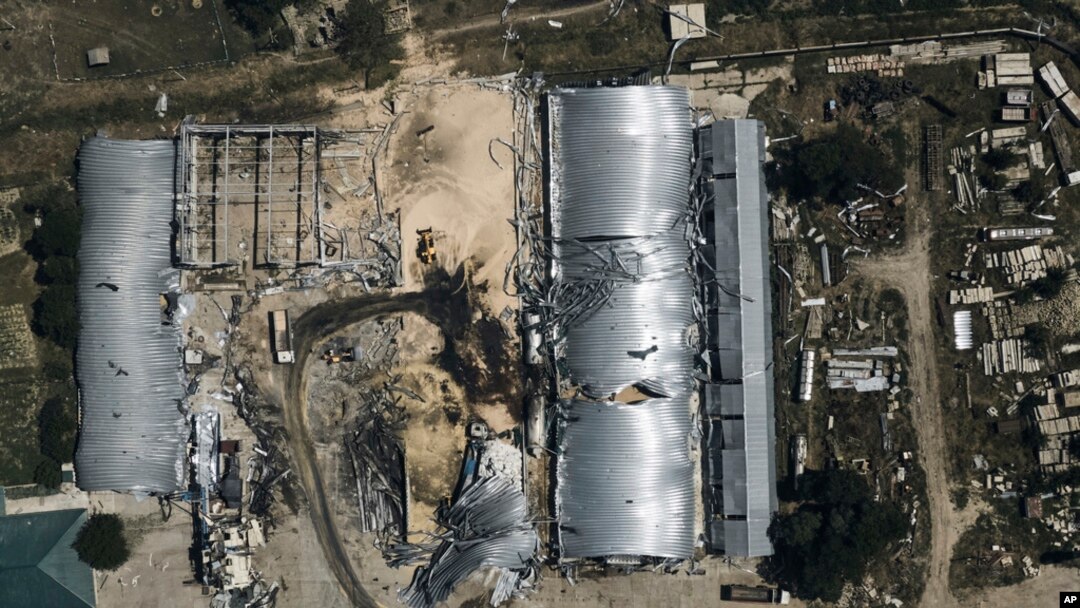Latest developments:
- Ukrainian President Volodymyr Zelenskyy has dismissed Ukraine's ambassador to Britain. The ambassador had publicly criticized Zelenskyy's response to remarks from outgoing British Defense Secretary Ben Wallace that Ukraine should show more gratitude for weapons from its allies.
- The World Bank's private investment arm is considering $1.5 billion in investments in Ukraine's banking, agribusiness and infrastructure sectors, a senior official with the International Finance Corporation said Friday.
- Prominent Russian nationalist Igor Girkin was arrested Friday in Moscow on charges of inciting extremism. Girkin had accused Russian President Putin and army leaders of not conducting the war in Ukraine effectively. His detention follows the short-lived mutiny by Wagner boss Yevgeny Prigozhin against Russia's top brass.
Russian attacks on Ukrainian Black Sea ports could have "far-reaching impacts on global food security, in particular, in developing countries," the United Nations political affairs chief Rosemary DiCarlo told the Security Council on Friday.
DiCarlo also called threats about the potential targeting of civilian vessels in Black Sea waters — made by both Russia and Ukraine — unacceptable.
"Any risk of conflict spillover as a result of a military incident in the Black Sea — whether intentional or by accident — must be avoided at all costs, as this could result in potentially catastrophic consequences to us all," she said.
Russian cruise missiles pummeled Ukrainian food export storage facilities in Odesa early Friday, threatening a global food crisis in retaliation for sanctions levied against it. Friday's attacks followed a three-day barrage of the region's Black Sea port infrastructure.
"Unfortunately, the grain terminals of an agricultural enterprise in Odesa region were hit. The enemy destroyed 100 tons of peas and 20 tons of barley," regional governor Oleh Kiper said on the Telegram messaging app.

Emergency service personnel work at the site of a destroyed building after a Russian attack in Odesa, Ukraine, July 20, 2023.
Two people were injured, Kiper said, while officials reported seven dead in Russian airstrikes elsewhere in Ukraine.
Moscow has described the attacks as retaliatory after Ukraine's strike on the Russian-built bridge to Crimea. Russia accuses Ukraine of using the sea corridor to launch terrorist attacks.
"Terrorist attacks are when Russian anti-ship missiles hit shopping malls, hospitals, and grain terminals," tweeted Mykhailo Podolyak, a Ukrainian presidential adviser, in response.
Russia said its Black Sea fleet had practiced firing rockets at "floating targets" and it would deem all ships heading for Ukrainian waters to be potentially carrying arms.
Kyiv responded with a similar warning about ships headed to Russia.
Since the grain deal expired Monday, the number of ships loading grain cargoes from the Black Sea area has fallen by 35%. Uncertainty grows over whether commercial traffic could be hit by Russia, and insurance shipping companies have now suspended coverage for shipments from Ukraine apart from the smaller ports along the Danube, insurance industry sources said on Friday.
FILE - A bulk grain cargo ship is anchored in the Black Sea near the entrance of the Bosphorus Strait in Istanbul, Turkey, July 17, 2023.
Meanwhile, dozens of ships were waiting to pass through the Danube channel on Friday, including vessels bound for Romania or leaving from there, according to data from analytics company MarineTraffic.
The attacks on Ukraine's grain export infrastructure and fears about the fate of grain shipping have triggered a spike in prices of grain products.
Turkish President Recep Tayyip Erdogan said Western countries should address Russia's demands to restore the Black Sea grain corridor.
The U.S. Treasury Department said Thursday it has imposed new Russia-related sanctions to "reduce Russia's revenue from the metals and mining sector, undermine its future energy capabilities and degrade Russia's access to the international financial system."
Wagner Group
The last of the Wagner Group's convict-prisoner mercenaries are scheduled to be released from their mandated service "in the coming days," the British Defense Ministry said Friday.
In the ministry's daily intelligence report about Russia's invasion of Ukraine, it said "a significant number" of the pardoned convicts will likely continue with Wagner as professional contractors. Russia now controls Wagner's prison recruitment pipeline, according to the ministry.
The Wagner Group staged a mutiny against Russian President Vladimir Putin's authority last month. The end of the Wagner Group's prison recruitment program marks one of the bloodiest episodes in modern military history, the British ministry said, with as many as 20,000 convict-recruits killed in a few months.
CIA Director William Burns said Thursday at the Aspen Security Forum, a U.S. national security and foreign policy conference, that the mutiny was a "very complicated dance," and Putin is likely biding his time until he can decide how to exact revenge on Yevgeny Prigozhin, the leader of Wagner Group.
"In my experience, Putin is the ultimate apostle of payback, so I would be surprised if Prigozhin escapes further retribution," Burns said.
VOA National Security Correspondent Jeff Seldin, VOA Pentagon Correspondent Carla Babb, VOA White House Correspondent Anita Powell, U.N. Correspondent Margaret Besheer and VOA's Anna Chernikova in Kyiv contributed to this story. Some information was provided by The Associated Press, Agence France-Presse and Reuters.


